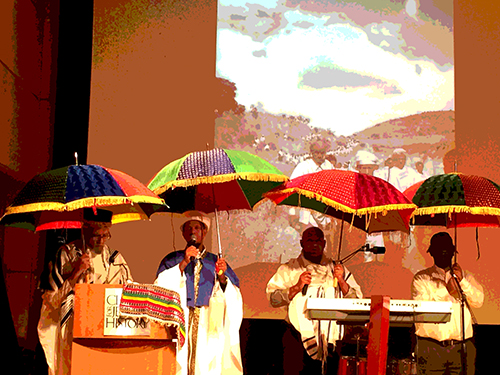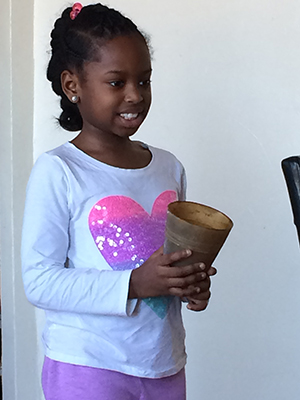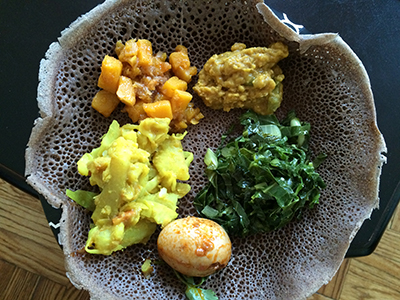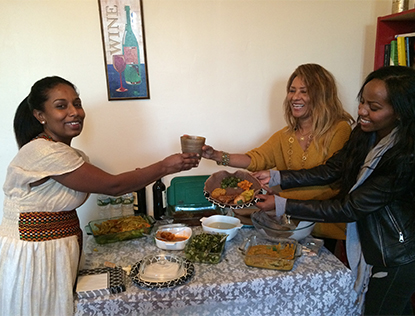American View
Ethiopian Jews in America

On a wintry Sunday afternoon, Helen Alefe is preparing a lavish Ethiopian meal for a small group of friends at her apartment in Brooklyn. She stirs a pot of collard greens and onions, spices it with salt, cardamom, cumin and turmeric, then adds fresh garlic. She has already cooked chicken and eggs with red berbere (powdered chili pepper and other spices); a dish of potatoes, carrots and cabbage; cubed sautéed butternut squash; a red lentil stew; and the beloved pancake-like bread called injera.
As she cooks, Alefe, who will turn 40 in December, confides that she is saving her money to open a kosher Ethiopian restaurant. Currently, she works for an internet marketing company. Though she has studied hairstyling, she can’t get a job in the field, she says, mostly because she won’t work on Shabbat and Jewish holidays. Her son, Osher, 11, is in public school but previously attended a Hebrew-language charter school that also teaches students about Israel. Her daughter, Agam, 9, still attends the school. Both receive their religious education from a nearby Chabad center. On Shabbat, Alefe and her children attend one of the many synagogues in their neighborhood.
Though Alefe speaks fluent Amharic, the official language of Ethiopia, her children only understand a few words. Agam knows her Amharic name, Furnoos (happy). A photo of Alefe in a traditional, embroidered white cotton dress shows her presenting her parents with a family tree that counts seven generations back on both her maternal and paternal sides. After her cooking is done, Alefe changes from her jeans and T-shirt into that same dress. “I want to teach my children where I come from,” she says. “I don’t want them to be lost.”
Alefe is one of an estimated 2,000 Ethiopian Jews who have settled in North America, scattered in hubs from the New York metropolitan area to Miami, Los Angeles, Toronto and Montreal. Most emigrated from Israel, where their families were airlifted during three dramatic rescue efforts—dubbed Operations Moses, Joshua and Solomon—that brought some 25,000 individuals to Israel between 1984 and 1991. Today, 140,000 Ethiopian Jews live in Israel; 50 percent are under age 19, and 30 percent were born in Israel.

Most of those who moved to North America were born in Ethiopia. Some came to explore and expand their horizons after their army service and decided to stay, as many Israelis do. Others say they left Israel to seek new opportunities as well as escape the racism they experienced in the form of economic discrimination, lack of social acceptance and questioning of their halachic status.
The lives of Ethiopian Jews vary from religiously observant to intermarried, but they remain connected to one another, says Ethiopian-born Ephraim Isaac, 82, director of the Institute of Semitic Studies in Prince-
ton, N.J. “That’s the character and spirit of the Ethiopian people,” he says. “It doesn’t matter if we are in Washington, D.C., or New Jersey.”
With the memory of the discrimination they endured in their native land still fresh in their communal memory, most Ethiopian Jews are fiercely loyal to their Jewish identity and customs. Many members of the small dispersed group in the United States—which lacks a religious leader and has no communal infrastructure or synagogue dedicated to its unique culture—retain ties to each other. Several are engaged in efforts to deepen these connections.
Photographer Joan Roth, 76, has witnessed these Jews’ dramatic exodus from Ethiopia as well as their struggles to integrate into Israel and the United States. One of Alefe’s guests at the recent festive meal, Roth has been a friend to many in the community since she traveled to the African nation in November 1984. She notes that their values are still strong today: family, keeping Shabbat, loving Israel, learning to appreciate and hold onto your faith under all circumstances. Even if intermarried, she says, their children are being raised Jewish. “They have great loyalty to their community and care about it,” Roth says, adding that “it’s not simple. They are working people, struggling to make it. They may not be cohesive, but they are always there for one another.” Last year, for instance, a young woman in her 30s died in New York, and Ethiopian Jews from all over the country raised money to send her body to Israel for burial.

The loyalty extends back to their shared experiences, in Ethiopia and in Israel. “We grew up Jewish in Ethiopia,” explains Alefe. “We kept everything—Shabbat, holidays. There we were told, ‘This is not your country.’ We were called Falasha [landless wanderers], meaning we don’t have a place. We thought of Jerusalem as heaven…. When we got to Israel, people of our own blood told us we are not Jewish. I don’t care if you say I’m black, but if you say I’m not Jewish, it hurts.”
Alefe’s family lived in Adar Adiba, a village in the Gondar district in northern Ethiopia. Her grandmother, imbued with Zionist hope, took Alefe’s three older sisters and walked through Sudan and Egypt to Israel, arriving there in 1985; her father was flown to Israel in 1988 because of an emergency medical need. Alefe and her mother joined them a year later. After being raised in Rehovot and serving her two-year military service in the Israeli Air Force, Alefe decided to travel to the United States. “I liked the American lifestyle: The Big City That Never Sleeps,” recalls Alefe, referring specifically to New York. “So without realizing it, time flew by so fast and it was very hard to go back.”
Alefe’s friend Bizu Riki Mullu similarly has pride in her traditions. She started promoting Ethiopian Jewish culture 14 years ago when she co-founded Chassida Shmella, the Ethiopian Jewish Community of North America, which is dedicated to connecting and empowering Ethiopian Jewry as well as educating and raising awareness about them in the broader Jewish society. The group’s name, which translates to “stork, stork” in both Hebrew (chassida) and Amharic (shmella), reflects the traditional wish to return to Jerusalem, following the migratory path of millions of storks that fly from Europe to Israel to Africa. “When we saw the storks in Ethiopia we would call, ‘Stork, stork, how is our beloved Jerusalem?’ ” Mullu explains. “We are part of the broader Jewish community, but we also want to preserve our heritage.”
One of Chassida Shmella’s best-attended programs is its annual celebration of Sigd, which commemorates God’s revelation to Moses and takes place 50 days after Yom Kippur. Last year, a large black-and-white photo that Roth took served as a backdrop for the ceremony. It shows Ethiopian Jews in the mountains of Ambober wrapped in their tallit-like clothing for the long liturgical ritual. “May the Almighty God bless all of you who have come to hear these holy prayers,” intoned Isaac, the scholar who led the service with Eli Muntsnot, an Ethiopian religious leader known as a kes. Muntsnot was flown in from Israel for the occasion since Ethiopian Jews in America are not able to support a kes of their own.

At Alefe’s Brooklyn gathering, Mullu, a designer and artisan specializing in Ethiopian jewelry and Judaica, proudly wears a lavish gold necklace and ring patterned after royal Ethiopian jewelry as well as a hamsa bracelet and blue eye beads. Mullu was 10 when she was brought to Israel in the late 1970s from her village of Mauri as part of Operation Begin, an early top-secret effort organized by then-Prime Minister Menachem Begin. She served as a representative for the Jewish Agency for Israel working with Ethiopian youth in Hadassah-funded Youth Aliyah villages and was sent to the United States in 1991 as an emissary for the Jewish Agency.
One of the first Ethiopian Jews to settle in Manhattan, Mullu’s large extended family—eight siblings and 45 nieces and nephews—remains in Jerusalem. Asked why she stays in the United States, she says, “I don’t really have an answer to why I’m here. I’m very Zionist and love Israel and my family. I was young and didn’t think I was moving to America [permanently]. Maybe God is saying something to me. Maybe God wants me to be here to help our community. I am a proud Jew. I am a proud Ethiopian. I am a proud Israeli. I want to pass on to other people how I feel and help people feel happy with who they are.”
Toward the end of the meal, Alefe rinses, dries, fries and grinds the coffee beans (boona in Amharic) for an elaborate three-cup coffee ceremony that is a tradition in Ethiopia. She explains that the first cup is for welcome (avona); the second is for news (tona); and the third is a thank you and farewell (mevareka). Mullu, who is married to Gal Gershovsky, an Ashkenazi Israeli musician, articulates her personal prayer: “We can make a lot of beauty sharing and celebrating our traditions together,” she says, “instead of focusing on our differences.”
Mullu worries about many in her community. She estimates that about 25 percent of Ethiopian Jews residing in the United States don’t have a green card and about 75 percent of them are intermarried, with 50 percent of those marriages ending in divorce. Alefe, for example, was raised in a religious home and couldn’t imagine marrying a non-Jew. But after her older sister was murdered in Israel by her Ethiopian husband, she recalls thinking, “If someone is evil, what does it matter?” She married her Haitian boyfriend and they had two children together before divorcing 11 years later because, she says, “our cultures are different. The way we think is different.”
Fewer Ethiopian men marry out than women because they want their children to have Jewish mothers so they will be Jewish according to halacha, or Jewish law. Some of those who emigrated from Israel may take their Jewish identity for granted and consider religion unimportant, especially since their hard-fought battle to “become Israeli” often came at the expense of their heritage. Others reconnect to their religious roots in the United States or become more observant through Chabad.
A few have managed to integrate into mainstream American Jewry. Shmuel Legesse, 43, a Manhattan resident, met his wife, Rachel, an Orthodox Ashkenazi Jew from Cedarhurst, N.Y., while working on his dissertation in educational administration and leadership at Yeshiva University. Neither side of the family objected to the marriage. Legesse attends three Orthodox synagogues in his neighborhood. “I’m the exception among Ethiopian Jews,” he says, acknowledging that he sees “a difference in how the Ashkenazim in the congregation look at me.” But, he says, “Who cares? I’m there to daven. I’m part of the community now.”
Legesse came to the United States in 1999 with his mother to look for a job after graduating with a degree in counseling and education; his father died in Ethiopia when he was in high school. Legesse did outreach to youth at risk in Washington Square Park in Manhattan. He made aliyah with his mother in 2008 to honor his father’s deathbed wish, but returned to the United States for his Ph.D., which is still in progress. He is currently a probation officer and educator in New York City.
Promoting and assisting their community is a priority for several Ethiopian Jews who are engaged in efforts to connect to one another.
Uri Degu, 43, a self-employed locksmith with degrees in statistics and actuarial science who lives in Alexandria, Va., has co-founded a new organization called the Association of Beta Israel in the USA. Through social media, Degu and four friends are reaching out to Ethiopian Jews to pinpoint their numbers and, he says, to bolster a sense of solidarity. He wants to pass down his heritage to his 8-year-old daughter, Leah, but acknowledges that, so far, “I don’t think she can explain what it means to be an Ethiopian Jew. She goes to public school and is mostly American.”
Beejhy Barhany, 42, also is working to promote Ethiopian Jewish culture even as she, like many in the community, bonds with African-Americans and other blacks, especially immigrants. She and her husband, a native of Dominica, opened Tsion Café, an Ethiopian-American-Middle Eastern fusion bakery and café in Harlem four years ago. The eatery—its menu has many vegetarian dishes but is non-kosher—hosts art exhibits, poetry readings and musical performances. “The best way to introduce people to Ethiopia is through its food,” Barhany, who is also the restaurant’s chef, says, adding that she chose the name to symbolize diversity, spirituality and her connectedness to Jerusalem. Recently, she recalls, an Israeli woman brought her adopted 10-year-old Ethiopian daughter to Tsion to learn about
her heritage.
Echoing other Ethiopians Jews, Barhany says, “I’m not just Ethiopian, I’m also Israeli and American.” Barhany was born in Tigray Province, moved to Israel in 1983 and came to the United States 18 years ago. Fifteen years ago, she established BINA (Beta Israel of North America) to connect Ethiopian Jews and encourage their culture through events like film screenings.
Legesse has his own vision for helping his community. Worried that Ethiopian Jews will “lose all” unless they integrate their distinctive customs with mainstream halachic Judaism, he envisions creating a modern Orthodox siddur that will feature additional Ethiopian traditions and customs as well as blessings in Amharic.
“We need to all find common ground with other Jewish communities and be a part of Am Yisrael,” says Legesse. “In that way we can say ‘brother,’ not ‘black’ or ‘white.’”
Rahel Musleah, a frequent contributor to Hadassah Magazine, runs Jewish tours to India and speaks about its communities (explorejewishindia.com).










 Facebook
Facebook Instagram
Instagram Twitter
Twitter
Debra Schneider says
Alefe, please come to Long Island & open a restaurant here (5 towns, West Hempstead) & I promise my husband & I will visit a lot! We love Ethiopian food & you could enlighten most of the population here! We have eaten it mainly in Montreal of all places, but it wasn’t Kosher. I think this story is fascinating & we need to be open to all of “our tribe”.
Mulu says
Helen Alefe is one of the strongest women I know. She is a proud Jewish Ethiopian and Israeli. She is an amazing and inspiring mom. I can’t wait to see her open her own restaurant. I will be the first to visit and share my own Ethiopian recipes.
Cheryl says
I would love to work with this community to educate others about it. I am a dancer and my dance company educates through the arts.
Stephen Moffett says
Where is the Ethiopian Jewish community in Washington DC or Maryland I am interested in converting …sirudc@yahoo.Com Stephen
Regina F Grimes says
I would love to know if there is a community in Fredericksburg, VA.
Cathrine Amal says
Thank for enlightening me on your community. I’m interested in meeting you to learn more about your culture and lives.
Catherine Amal says
Sorry my name is Catherine.I had made a mistake on it. Thank you.
Daniel says
We are all of one family there is no difference based on the color of our skin. We are all brothers and sisters who come from the house of Israel.
Malik says
Please provide me with some information on the Ethiopian Jewish community / Synagogues in Washington DC, Maryland and Virginia I’m interested in donating and learning more about the religion.
jaexil gilroy maitre says
please send all available information
rita schwartz says
I am on the board of the Brooklyn Jewish Historical Initiative studying and learning about the history and place for Jews in Brooklyn. You are fascinating. and would so much want to talk to you. Although we are on virus pause now, we have been visiting various jewish communities in Brooklyn to study their music and listen to have prayers are chanted. Cantor Bruce Ruben joins me in our visits…for services, conversations with Rabbis, Cantor and members of the congregations…..Is it possible for us to e mail or talk on the phone. Please. Rita Schwartz–and yes I live in Brooklyn!
Stephen Somerstein says
Back in the 1960s there was a thriving Ethiopian Jewish synagogue and community in Harlem. I visited it and attended services once on a visit. There were at least fifty family members at the service I attended. The rabbi was an impressive personality.
Bonnie Proctor says
I am a third generation decendant of Graenam Berger, and looking for contemporary information. I am a third generation from resident of Silver Spring, MD.